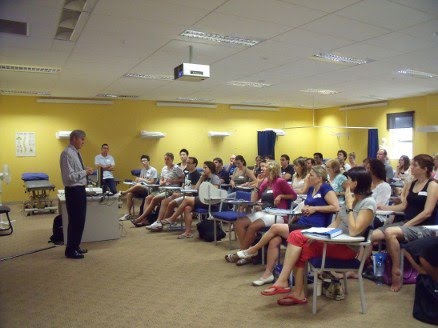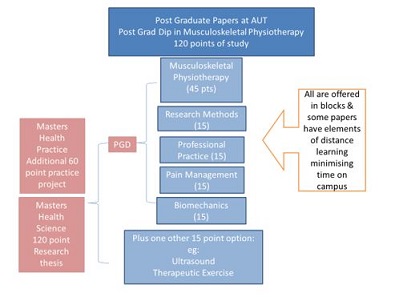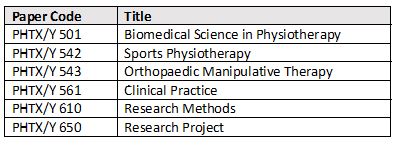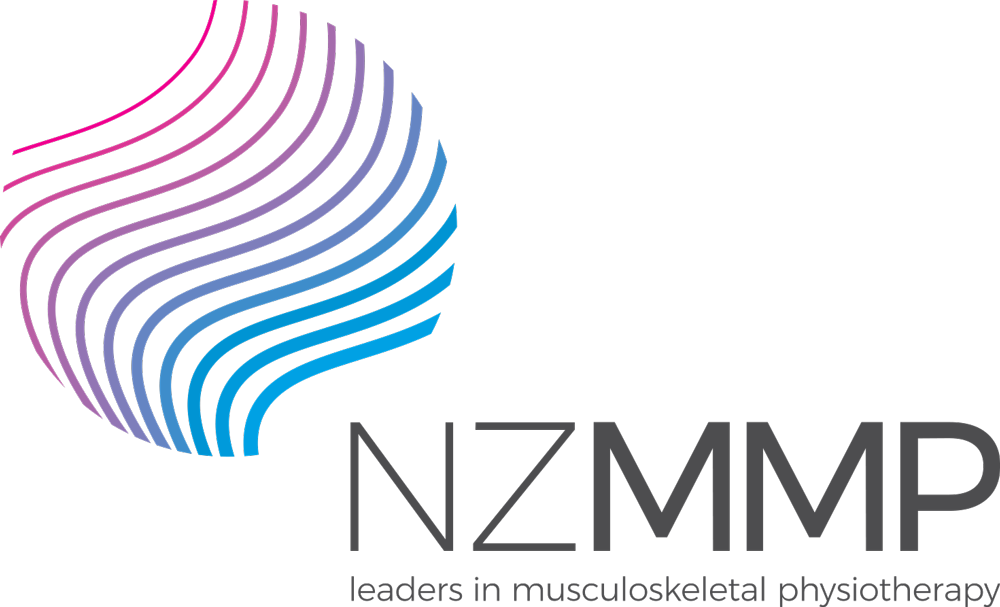
Post Graduate Study in Musculoskeletal Physiotherapy in New Zealand
The relationship between NZMMP and the Tertiary Providers and the place of the COMT course.
NZMMP was the first organisation in NZ to provide post graduate training in manipulative therapy and for many years taught examined and graduated people with the Diploma of Manipulative Therapy (DipMT). This programme was superseded in the mid 90’s as the University programmes developed and the formal university qualifications of post graduate diplomas and Masters degrees emerged. To fill the gap between leaving undergraduate education and committing to university programmes NZMMP developed the College Accredited Membership (CAM) Courses. This was of value when the NZ College of Physiotherapy was functioning. When this route to college membership stopped NZMMP changed the course again to the current offering, the Certificate of Orthopaedic Manual Therapy (COMT). This current course is popular for a range of physiotherapists from new graduates to older more established therapist who want to keep up, to those returning to the work force after time out. The course is weekend based and is completed via eight weekends over two years. These courses are taught by experienced manual therapists all with post graduate qualification and strong affiliations with Auckland University of Technology and University of Otago. The course assistants are all experienced clinicians.
What is the aim of this programme?
To foster and extend musculoskeletal diagnosis, management and clinical reasoning beyond the baseline undergraduate competencies.
These weekend courses do not include assignments or practical examinations and the COMT is not a formally recognised qualification with the tertiary education frame work. The course is for interest and self-advancement and clearly meets your CPD requirements for the NZ Physiotherapy Board. There is no formal credit for these courses if you wish to enter into a post graduate course at a University.
What is different in the University courses?
Whist the content of the techniques and lectures provided on the COMT course are similar to the university programmes, the latter provide far greater depth of reading, critical use of evidence to support practice, 150 hours of supervised clinical practice, assignments and a practical examination. There are also other post graduate papers required to complete post graduate certificates, diplomas and masters degrees. The post graduate diploma programmes are also monitored and accredited by the International Federation of Manual and Musculoskeletal Physical Therapists Incorporated (IFOMPT). This makes the qualification international recognised and allow therapist to receive reciprocal recognitions with other countries who deliver IFOMPT accredited programmes. The COMT programme is not of that level.
Therefore, if you are considering which way to go with our post graduate education you need to consider the end point. If you want a course that will extend your skills but is not a formal qualification then the COMT is for you.
If you want an internationally recognised and accredited manual therapy qualification that is also part of the pathway to advanced practice and specialisation, then the university programmes are pathway for you.
AUT Pathway

Relevant Paper leader contact at AUT
Dr Steve White – steve.white@aut.ac.nz
University of Otago – School of Physiotherapy Pathway
Postgraduate programmes (PGCertPhty, PGDipPhty and MPhty) by coursework offer the opportunity to undertake papers tailored to your specific areas of physiotherapy interest.
Programmes enable you to update your qualifications wherever you live in New Zealand and beyond. Postgraduate study offers opportunities for flexible learning through primarily distance learnnig (extramural). Due to the technical skills required for physiotherapy practice, some of the post-graduate papers also include residential placements.

University of Otago postgraduate papers are all worth 30 points and this equates to 300 hours of study for each paper taken per semester. This is approximately 20 to 25 hours of work each week for each paper. Most domestic students study part-time and work part-time.
Postgraduate study can be undertaken as:
Postgraduate Certificate (60 points) – PHTY 501 followed by paper(s) worth 30 points
Postgraduate Diploma (120 points)
Master’s (180 papers)
Alternatively you can undertake a Masters by research (thesis) when you complete two approved papers (total 60 points) and a thesis (120 points) embodying the results of one year of full-time or equivalent part-time supervised research.
Please contact:
Associate Professor: Cathy Chapple – cathy.chapple@otago.ac.nz for information about Phty543
or Dr Ally Calder, Associate Dean Postgraduate Studies – ally.calder@otago.ac.nz
